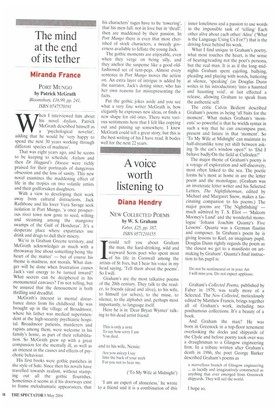A voice worth listening to
Diana Hendry
NEW COLLECTED POEMS by W. S. Graham Faber, £25, pp. 387, ISBN 0571210155 Icould tell you about Graham the man, the hard-drinking, wild and wayward Scots poet who spent most of his life in Cornwall among the artists of St Ives, but I hear his voice in my head saying, 'Tell them about the poems'. So I will.
Graham's are the most talkative poems of the 20th century. They talk to the reader, to friends (dead and alive), to his wife, to himself (or selves), to the muse, to silence, to the alphabet and, perhaps most importantly, to language itself.
Here he is in 'Dear Bryan Wynter' talking to his dead artist friend:
This is only a note
To say how sorry I am You died.
and to his wife, Nessie:
Are you asleep I say Into the back of your neck For you not to hear me.
(`To My Wife at Midnight') 'I am an expert of aloneness,' he wrote to a friend and it is a combination of this inner loneliness and a passion to use words in the impossible task of 'telling/ Each other alive about each other/ Alive' (What is the Language Using Us For?') that is the driving force behind his work.
What I find unique in Graham's poetry, what most touches the heart, is the sense of hearing/reading not the poet's persona, but the real man. It is as if the long midnights Graham spent cajoling, bullying, pleading and playing with words, battering at silence, 'speaking' (as Douglas Dunn writes in his introduction) 'into a haunted and haunting void', at last effected a release. allowing Graham to speak from the authentic self.
The critic Calvin Bedient described Graham's poems as being 'all baits for the moment'. What makes Graham's 'moments' so powerful is that he wields syntax in such a way that he can encompass past, present and future in that 'moment'. So `To My Wife at Midnight' can maintain its half-dreamlike tone yet shift between asking 'Is the cat's window open?' to 'Did I behave badly/On the field at Culloden?'
The major theme of Graham's poetry is a voyage of exploration and self-discovery, most often linked to the sea. The poetic forms he's most at home in are the letter poem and the monologue. (Graham was an inveterate letter writer and his Selected Letters, The Nightfisherrnan, edited by Michael and Margaret Snow, makes a fascinating companion to his poems.) The major poems are 'The Nightfishing' — much admired by T. S. Eliot — 'Malcom Mooney's Land' and the wonderful monologue 'Johann Joachim Quantz's Five Lessons'. Quantz was a German flautist and composer. In Graham's poem he is giving lessons to Karl, an imaginary pupil. Douglas Dunn rightly regards the poem as 'the closest we get to a manifesto on artmaking by Graham'. Quantz's final instruction to his pupil is:
Do not be sentimental or in your Art I will miss you. Do not expect applause.
Graham's Collected Poems, published by Faber in 1979, was really more of a Selected. The New Collected, meticulously edited by Matthew Francis, brings together all of Graham's work, including two posthumous collections. It's a beauty of a book.
And Graham the man? He was born in Greenock in a top-floor tenement overlooking the docks and shipyards of the Clyde and before poetry took over was a draughtsman to a Glasgow engineering firm. In a tribute written after Graham's death in 1986, the poet George Barker described Graham's poems as
a marvellous branch of Glasgow engineering ... as lucidly and imaginatively constructed as anything that ever emerged from Greenock shipyards. They will sail the world.












































































 Previous page
Previous page